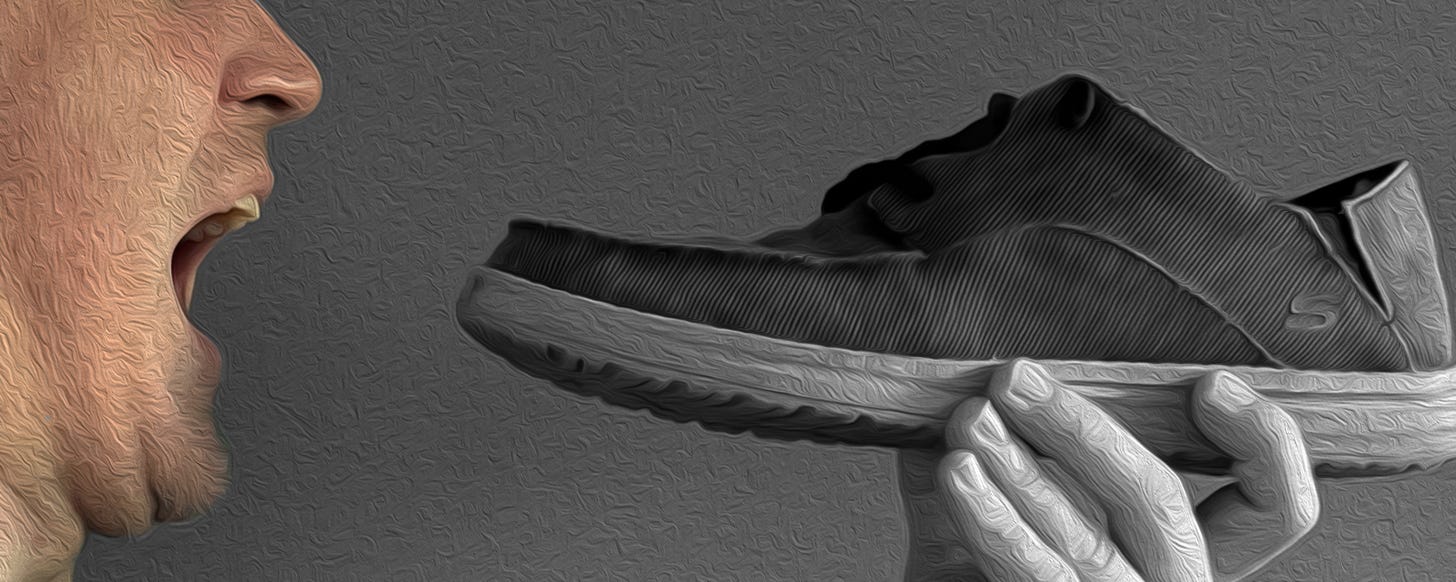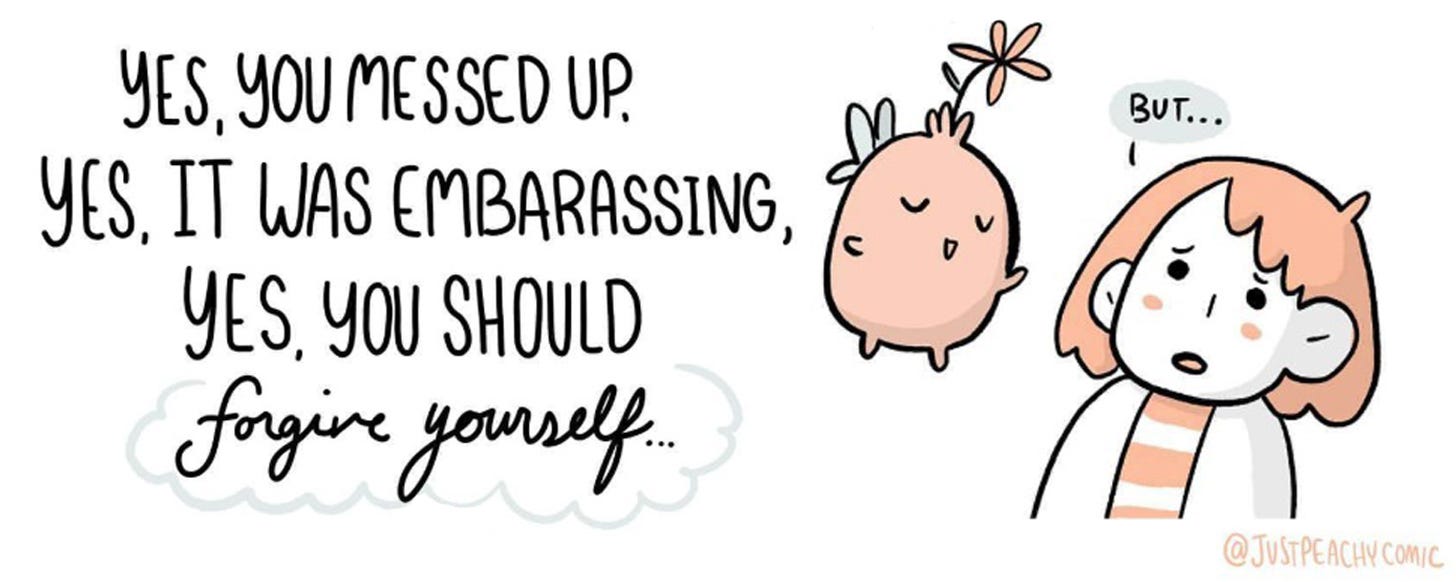Chapter 12 - Screwing Up
What to do when you’ve done wrong.
An audio version of this post is available below (for paid subscribers).
If I had a nickel for every time I screwed up I wouldn’t have a paywall on this Substack.
Perfection is unattainable, as much as we rage against it. So as we seek to alleviate our friends’ pain, we may unintentionally cause some in the process. These errors can unleash a torrent of emotions like guilt, anger, and resentment. They can make you not want to try to help at all. Under normal circumstances, patching things up can take a lot of patience. When your friend is suffering due to an unrelated event, it can take forever.
“If you’re not making mistakes, then you’re not doing anything.” John Wooden
Emergencies are minefields. We tiptoe around each issue, hoping we can feel our way through the delicate situation, knowing that something will inevitably explode. I want these chapters to help you navigate this perilous terrain, but nobody’s perfect. Sooner or later you’re going to goof. And (hoping I’ve gotten some things right), here’s how to keep a bad situation from getting worse.
Common mistakes.
Breaking a promise.
Changing your plans at the last minute without warning.
Getting the wrong thing (when you knew it was wrong, but went ahead anyway).
Invading someone’s space, or disrespecting their privacy.
Saying something insensitive or insulting.
Forgetting an important date, like a surgery, or a funeral.
Indirectly causing someone to get injured.
Did you actually mess up?
The first rule is a good one to remember in many circumstances: it’s not about you. We can be so wary about people’s feelings, we might assume mistakes were made when our friends are actually focused on other things. Or our offenses were so minor they were quickly forgotten or overlooked. It’s not the “silent treatment.” Your friend doesn’t feel like talking. Or they could be going through something that you’ll find out about later. I’ll be a broken record about this: if they don’t respond, don’t persist in your attempts to get their attention. They know you’re reaching out. They’ll get back to you when and if they want (or have the energy) to, and giving them that space is a kindness.
If you’ve considered this and still feel like you’re in the wrong…
Seek forgiveness.
I realize I wrote a chapter on how not to say you’re sorry, but in this case you should consider it. Unless you take an hour to do it, apologies usually have a positive effect at best, and neutral effect at worst. Repairing part of a broken down relationship is loving and healing, and it’s almost never too late to do so. Highlight what you did wrong, and how it must have felt for your friend. And leave out the excuses: no one wants to hear the details regarding why the mistake was made. Your friend won’t care that you got caught in traffic, or slept in, or had to stay late at work. It doesn’t help ease their mind to know that you also had a bad day when the mistake was made.
Apologies have to be genuine, and your friend will know if it isn’t. An apology shouldn’t be a manipulation, or an attempt to save face. You’re doing something uncomfortable to preserve a relationship that’s meaningful to you. These connections are more important than who did what to whom, and why. So swallow your pride, put your ego behind you, and mean what you say.
Apologizing is one thing, receiving forgiveness that wipes the slate clean is another. Your job is to make sure your apology is honest and heartfelt. The rest is up to your friend. Your friend doesn’t have to forgive you just because you say sorry, and living with that discomfort and shame is up to you to handle. There are a host of reasons why, when you apologize, it may fall flat. Give your friend the space and time to decide what to do with your apology, and handle your own negative emotions on your own.
Start over.
Did you visit their home or hospital room at an inconvenient time? Buy them a steak dinner when they told you they’re vegetarian? If at first you don’t succeed, try, try again. Show them that you’re capable of listening to their specific needs and requests by doing it right a second time. You may need to exercise patience in regards to when you’ll be able to do this, but once the opportunity naturally presents itself, you can demonstrate your attentiveness.
Let it be.
Inaction can feel like insensitivity, but sometimes the best solution is to just be patient and let time heal a wound. Remember that people going through difficulties can lash out in unexpected and unexplainable ways. You may have just been in the wrong place at the wrong time. If it feels like your behavior, or even your presence, is agitating your friend, step away and see if that eases the tension. This can be difficult, and you may not get instant recognition for your efforts, but your friend will appreciate the gesture. Just make sure you’re available if they reach out for help.
There’s also the possibility that, following an argument, you feel that your friend is the one that messed up. Since they’re having a hard time, they may be unaware that their words and actions are hurting those around them. (See above: it’s not about you.) You don’t have to “be right” in order to “be helpful.” Try not to file your grievances away so you can settle them later on. No tallying up favors, or listing what’s owed. No one wants to survive a traumatic experience only to discover they have other situations they need to repair.
Is this a recurring issue? If you find yourself constantly screwing up when trying to help your friend, you may have to accept that you’re not the person they need right now. Your desire to be the hero that saves their day may obscure your better judgment and cause you to force yourself into unnecessary solutions. You can’t solve all of your friend’s problems, no matter how desperately you want to. Try patience instead. Your friend will thank you.
“To err is human; to forgive, divine.” Alexander Pope
I can’t predict how your friend will react to the decisions you make, so I can’t guarantee these tips will mend any breaks in your bond. What I do know is that the small issues in your friendship will have to get in line behind the big one that your friend is surmounting as they face their horrible thing.
What can you do while you wait for forgiveness? Forgive yourself. Helping someone while harboring a heart full of self-recrimination is counter-productive and will exhaust everyone around you. Face what you’ve done, apologize, and then find forgiveness within.
Let’s talk it out.
When you messed up while trying to provide backup, how did you correct it? Any unresolved issues you have with unhelpful helpers? Have your own hurt feelings ever gotten in the way of helping a good friend? Let me know in the comments.
An audio version of this post is available below (for paid subscribers).
Keep reading with a 7-day free trial
Subscribe to The Friend's Guide to Horrible Things to keep reading this post and get 7 days of free access to the full post archives.






